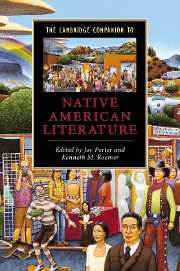Book contents
- Frontmatter
- Introduction
- Timeline
- Part I Historical and cultural contexts
- Part II Genre contexts
- Part III Individual authors
- 10 N. Scott Momaday
- 11 Simon Ortiz
- 12 James Welch
- 13 Leslie Marmon Silko
- 14 Gerald Vizenor
- 15 Louise Erdrich’s storied universe
- 16 Joy Harjo’s poetry
- 17 Sherman Alexie
- Bio-bibliographies
- Further reading
- Index
- Series List
15 - Louise Erdrich’s storied universe
from Part III - Individual authors
Published online by Cambridge University Press: 28 May 2006
- Frontmatter
- Introduction
- Timeline
- Part I Historical and cultural contexts
- Part II Genre contexts
- Part III Individual authors
- 10 N. Scott Momaday
- 11 Simon Ortiz
- 12 James Welch
- 13 Leslie Marmon Silko
- 14 Gerald Vizenor
- 15 Louise Erdrich’s storied universe
- 16 Joy Harjo’s poetry
- 17 Sherman Alexie
- Bio-bibliographies
- Further reading
- Index
- Series List
Summary
At her best, Louise Erdrich spins interconnected tales of unforgettable characters; to read her works is to play an active reader-role within an elaborately structured, historically allusive universe that is rich in layered meaning. Erdrich's recurrent themes concern the ties between people and geographical locations, the importance of community among all living beings, the complexities of individual and cultural identity, and the exigencies of marginalization, dispossession, and cultural survival. Family and motherhood, storytelling, healing, environmental issues, and historical consciousness are likewise central, thematic emphases that thread Erdrich's works into the expanding web of contemporary American Indian literature.
Moreover, a cross-cultural vision registers powerfully in Erdrich’s works and originates directly within her personal experience. Erdrich is the daughter of Ojibwe and German parents. She was born 7 June 1954, to Ralph Louis and Rita Joanne (Gourneau) Erdrich in Little Falls, Minnesota. She spent much of her youth in Wahpeton, North Dakota, where her parents taught at the Wahpeton Indian Boarding School. Her maternal grandparents ran a butcher shop in Little Falls, perhaps inspiring her invention of the Kozkas in The Beet Queen (1986) and, more recently, Fidelis Waldvogel in The Master Butchers Singing Club (2003). Erdrich’s grandfather, Patrick Gourneau, was a beader, storyteller, and powwow dancer who also served as tribal chair of the Turtle Mountain Band of the Chippewa. Erdrich and her siblings were raised as Catholics, so the author of Love Medicine (1984, 1993) and other works knows firsthand the experiences of her characters whose spiritual worlds blend Ojibwen and Catholic cosmologies.
- Type
- Chapter
- Information
- The Cambridge Companion to Native American Literature , pp. 271 - 282Publisher: Cambridge University PressPrint publication year: 2005
- 4
- Cited by



